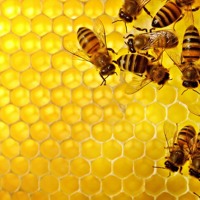Ad Code
Translate
Smart strategies for trading on crypto exchanges
October 20, 2025
Five Do’s For a Healthy Turnover That Bolsters Talent-Retention
October 20, 2025
Discover Honeybee Pharmacy (2025 Guide Important Consumer Tips)
October 14, 2025
What is Ozempic (semaglutide)? (Updated in 2025)
January 30, 2025
Posture Bra: Improving Back Support and Comfort
October 20, 2025
How To Find Suitable Properties In Cyprus?
October 20, 2025
10 Effective Strategies to Improve Domain Authority of Your Website
October 20, 2025
No bees, no humans...Why humans (and everything else) need bees to survive
Khabza Mkhize
July 24, 2024
Bees play a crucial role in the survival of humans and many other species through their role in pollination. Here's why bees are essential:
1. Pollination of Food Crops
- Food Production: Bees are responsible for pollinating around 75% of the fruits, vegetables, nuts, and seeds we consume. Without bees, many of these crops would fail to produce fruit, leading to reduced food availability and higher prices.
- Nutritional Diversity: A variety of crops like apples, berries, almonds, and cucumbers rely on bee pollination. Without bees, our diets would lack diversity and essential nutrients.
2. Biodiversity
- Plant Reproduction: Bees pollinate a wide range of plants, supporting plant diversity and the health of ecosystems. Many wild plants depend on bees to reproduce.
- Ecosystem Health: Diverse plant life supports a wide range of animals, creating balanced and resilient ecosystems.
3. Economic Impact
- Agricultural Economy: Bees contribute significantly to the agricultural economy through the pollination of commercial crops. The decline of bee populations can lead to decreased crop yields and economic losses for farmers.
- Job Creation: The agricultural sector, which relies on bee pollination, provides employment for millions of people worldwide.
4. Wildlife Support
- Food Chains: Bees support food chains by enabling the growth of plants that provide food and habitat for other animals, including birds and mammals.
- Habitat Creation: Plants pollinated by bees provide habitats and food sources for a multitude of wildlife species.
5. Medicinal Plants
- Medicinal Crops: Many plants used in traditional and modern medicine require pollination by bees. The loss of bees could impact the availability of these medicinal resources.
6. Environmental Indicators
- Ecosystem Health: Bees serve as indicators of environmental health. Declining bee populations can signal broader environmental issues, such as pollution and habitat destruction.
Threats to Bees
- Pesticides: Exposure to harmful chemicals can weaken and kill bees.
- Habitat Loss: Urbanization and agricultural expansion reduce the natural habitats available to bees.
- Climate Change: Changes in climate can affect the availability of flowers and nesting sites, disrupting bee life cycles.
- Disease and Parasites: Bees face threats from various diseases and parasites, such as the Varroa mite.
Bees pollinate a third of everything we eat.
- They pollinate most fruit and vegetables, numerous nuts as well as plants such as rapeseed, sunflowers, cocoa beans, coffee, tea and cotton.
- Bees also pollinate crops grown as food for livestock.
- Crop pollination by bees is worth almost R2.5 trillion, according to the International Union for Conservation of Nature.
- Bees are indispensable to the planet’s ecosystem.
- We are dead without them.
- The Money Show’s Bruce Whitfield interviewed Professor Jill Atkins of the Wits School of Accountancy.
- Atkins talked about the science of bees and environmental accounting.
- Environmental accounting is a subcategory of accounting.
- It incorporates economic and environmental information.
Conclusion
The survival of bees is intrinsically linked to the well-being of humans and the planet. Protecting and conserving bee populations is vital for ensuring food security, maintaining biodiversity, and supporting healthy ecosystems. Efforts such as creating bee-friendly habitats, reducing pesticide use, and supporting sustainable agricultural practices are crucial steps in preserving bee populations.
Scroll down for quotes from the audio below.

THE SCIENCE OF: WHY HUMANS (AND EVERYTHING ELSE) NEED BEES TO SURVIVE
The science of bees (no bees, no humans) and environmental accounting, a subset of accounting incorporating environmental data.
- If people disappeared nature will thrive. If bees disappeared all life on Earth would be at risk. — Professor Jill Atkins
- Bee decline has a huge financial impact. — Professor Jill Atkins
- Colony Collapse Disorder was first noticed around the turn of the century. — Professor Jill Atkins
- Varroa mites are part of the reason for Colony Collapse Disorder. — Frederick Bezuidenhout (North-West University)
- Bees don’t have good immune systems. — Professor Jill Atkins
- There are literally millions of hives being transported around the United States every year. — Professor Jill Atkins
- Industrial bee-keeping seems to contribute to Colony Collapse Disorder. — Professor Jill Atkins
- There are parts of China where all the bees have disappeared. They have to, literally, pollinate everything by hand. — Professor Jill Atkins
- Integrated reporting brings environmental and social issues into the core of business strategy. — Professor Jill Atkins
- If the United States lost its bees it will cost $90 billion to pollinate by hand, if there were enough people to do it, which there aren’t. — Professor Jill Atkins
Bees are a big financial issue and must therefore be part of integrated reporting. — Professor Jill Atkins
Source: capetalk
Featured Post
DL Mining Launches Ethereum Contract Participation Service, Helping Users Earn $2K Stable Daily Returns
Zizo Gala-Mkhize-
October 20, 2025
Soapie Teasers
Sister Sites
Most Popular
List of 6,000+ Dofollow Commentluv Blogs FREE (Updated 2025)
January 16, 2025
Five Do’s For a Healthy Turnover That Bolsters Talent-Retention
October 20, 2025
What is Ozempic (semaglutide)? (Updated in 2025)
January 30, 2025
Popular posts
List of 6,000+ Dofollow Commentluv Blogs FREE (Updated 2025)
January 16, 2025
Five Do’s For a Healthy Turnover That Bolsters Talent-Retention
October 20, 2025
What is Ozempic (semaglutide)? (Updated in 2025)
January 30, 2025
Footer Menu Widget
Created By Blogspot Theme | Distributed By Gooyaabi Templates


Social Plugin